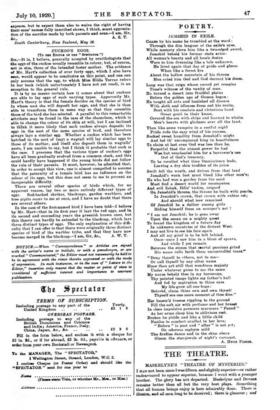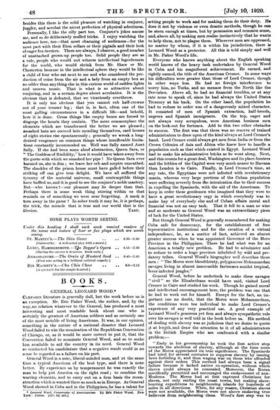THE THEATRE.
MASKELYNE'S "THEATRE OF MYSTERIES."
I H.AD not been since I was fifteen and slightly superior—or rather endeavoured to appear superior, because I went with a younger brother. The glory has not departed. Maskelyne and Devant remains better than all but the very best plays. Something that all human beings enjoy is here admirably done. There is illusion, and all men long to be deceived ; there is glamour ; and
besides this there is the solid pleasure of watching in conjurer, juggler, and acrobat the nicest perfection of physical adroitness. Personally, I like the silly part too. Conjurer's jokes amuse me, and so do deliberately mulled tricks. I enjoy watching the audience here, too—that most charming of audienoes---Lfor the most part with their Eton collars or their pigtails and their look of eager fox-terriers. There are always, I observe, a good number of unattached grown-up people too. Solid people they are as a rule, people who would not witness intellectual legerdemain for the world, who would shrink from Mr. Shaw or Mr. Chesterton because in the intellectual sphere they would be like a child of four who sat next to me and who considered the pro- duction of coins from the air and a lady from an empty box as no odder than anything else in this curious world of sudden lights and unseen music. That is what is so attractive about
conjuring, and in a certain degree about acrobatics. It is the obvious that is defeated, that we vicariously overthrow.
It is only too obvious that you cannot rub half-crowns out of your trouser leg ; that is, in fact, often one of the most galling circumstances in a difficult life—and behold, here it is done. Gross things like empty boxes are forced to disgorge the houris they contain. The more commonplace the elements which are transformed the better we are pleased ; smashed hats are coerced into mending themselves, card houses of eight stories rise spontaneously ; generally we wreak a long- desired vengeance on common things whose insufferable limita- tions constantly incommoded us. Well was Sally named Aunt Sally. If she had been some aloof abstraction, Queen Sara, or "The Goddess of Risibility," how it would have taken away from the gusto with which we smashed her pipe ! No Queen Sara ever harmed us, she is dim ; we leave her orb and sceptre unscathed. The shackles of the prison house must have galled before their striking off can give true delight. We have all suffered the tyranny of the material universe, small contemptible things have baffled us, and it is good to see the conjurer's noble mastery. But—who knows ?—our pleasure may lie deeper than that. Perhaps there is some weak thing stirring within us that reminds us of something we were near forgetting. A mask is torn away in the game ? In sober truth it may be, it is perhaps, the trick, the miracle that is true and our world that is the



































 Previous page
Previous page